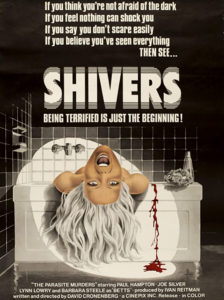|
Genres, Themes, Actors, and Directors:
- Barbara Steele Films
- David Cronenberg Films
- Horror Films
- Mad Doctors and Scientists
- Zombies
Response to Peary’s Review:
Peary notes that this “first of David Cronenberg’s low-budget horror films to play in the United States” “quickly established his cult”. Shivers presents an “intriguing setting” — an “isolated, sterile apartment complex which is a planned, self-contained community” — wherein a parasite with “the power to drive its carrier violently insane” is travelling “on its own from apartment to apartment through the plumbing”, and can also “be transferred from its carrier through sexual contact.” He posits that the “film has some tension at the beginning when the initial people are infected”, noting that the creepiest moment comes “when the parasite crawls between unsuspecting Barbara Steele’s legs while she bathes” (ewww!), then transfers from her throat to her lover’s while kissing — but he argues that the “story, character development, and the film itself go out the window when almost everybody in the building” (except Hampton) “becomes infected and runs through the halls looking for people to attack.”
Peary writes that while this “exploitation picture is too violent and crude”, the “special effects (i.e., creatures moving beneath the skin) by Joe Blasco anticipated those that would appear in future big-budget SF and horror films” — like Alien (1979). Because the sub-genre of “sci fi body horror” films isn’t a personal favorite, it’s hard for me to comment on whether Cronenberg’s film goes off the rails or simply continues along its own perversely logical trajectory; I can say that things certainly build to a tense fever pitch by the end, leading to a sense of claustrophobia and despair.

As Richard Scheib of Moria writes, “Shivers is Night of the Living Dead construed as a satire on the 1970s swinger lifestyle” — a very apt analogy indeed.
Redeeming Qualities and Moments:
- Some effectively creepy moments on a low budget

Must See?
No, though of course Cronenberg fans will be curious to check it out.
Links:
|



3 thoughts on “They Came From Within / Shivers / Parasite Murders, The (1975)”
⭐️⭐️⭐️ out of ⭐️⭐️⭐️⭐️
Decent, fast-paced sci-fi horror with body horror coming to the fore. You can tell it’s Cronenberg’s first because it’s rather uneven with some weak moments of acting and the production, although well produced, lacks polish; something DC wouldn’t get right until The Brood (1979) in my view.
Rabid (1976) is effectively a streamlined remake and a slight improvement.
I suppose a case could be made for this being a must see film for FFs as it’s Cronenberg’s first and brings the concept of body horror to science fiction explicitly to the fore.
A once-must, as a unique cult flick.
Having just rewatched this (after many years), I’m in agreement with the noted remark: “Shivers is Night of the Living Dead construed as a satire on the 1970s swinger lifestyle”. That makes particular sense in light of recently coming across Cronenberg’s statement that he sees his films as comedies (!) (~ which I can only assume is his way of saying his work, overall, gleefully embraces the absurd and is not really meant to be taken all that seriously.)
This time around, I was particularly taken with the director’s careful development of both the plot as well as the growing tension; both seem artfully exact.
I find making this kind of ‘comment’ on the post-Woodstock attitudes toward sexuality potent. I don’t necessarily see anything moralistic in it but it’s solid-enough for appreciation.